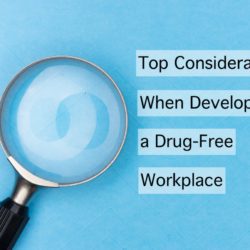This information is provided for educational purposes only. Reader retains full responsibility for the use of the information contained herein.
When implementing a quality drug-free workplace, proper steps must be taken to follow stringent guidelines to safeguard the program’s integrity. Workplace drug testing, for example, requires employers to take appropriate responsibility when implementing and conducting drug and alcohol testing. Often, the responsibilities are outsourced to a service agent that has the expertise and experience in coordinating testing services. Service agents may be used to administer part or all of the drug and alcohol testing program elements.
While employers choose which services to outsource, they retain responsibility for certain aspects of the testing program. Furthermore, the employer retains liability, meaning that it is critical to understand the testing requirements and the service agent duties and responsibilities involved with the program.
The Goal of a Drug-Free Workplace Program
There are several reasons companies choose to incorporate drug testing as part of the standard operating procedures for applicants and current employees. Primarily, the core object is to create safe and healthy work environments and to discourage drug and alcohol abuse in the workplace thus ensuring employees are fit to perform their assigned duties. Additionally, a comprehensive drug-free workplace program should educate employees on the issues involved with substance abuse, including the negative consequences that can affect a person’s health, home life and career.
Consequently, employers and employees benefit in other ways that result from workplace testing programs. A prime example is a reduction in lost productivity that occurs as a result of substance abuse. When there is a substance abuser in the workplace, other employees are affected because they are picking up the slack due to the users’ inability to stay focused on the job. Additionally, a substance abusing employee may cause injuries to other employees for the same reason. The employer would ultimately be affected by a drug user due to the costs associated with loss of productivity and the damage to company property and the filing of workers’ compensation claims.
Eventually the losses an employer experience will also affect their employees. At the end of the day, the employee may be affected at a much higher degree than the employer.
What Constitutes a Comprehensive Testing Program?
There are several components that are involved in creating a quality program. However, the key components include:
- Company substance abuse policy
- Drug and alcohol testing services, including, but not limited to:
- Qualified collections
- Laboratory services
- Medical Review Officer (MRO)
- Administration of random testing
- Confidential reporting of results
- Employee education
- Supervisor training
- Program administrative assistance and program consultation
Company Substance Abuse Policy
The first step in a successful drug-free workplace program is the implementation of a written policy. A policy reflects the company’s drug testing objectives and should clearly articulate prohibited behavior as well as the consequences for violating the policy. In addition, it describes who is subject to testing, under what circumstances testing will occur and how testing will be conducted. A policy serves as a summary of the company’s drug-free workplace program and is the core of the testing program.
Drug and Alcohol Testing Services
The essential services of the collection process, laboratory analysis, result review by an MRO, random selections and reporting of results are fundamental components of workplace testing. These services create a safety net for the testing process and establish the integrity of a legally defensible program. Typically, a service agent will coordinate some or all of these services on behalf of an employer, but they can be administered internally if desired.
Employee Education
Employee understanding and acceptance of the testing program is crucial to its success. It is imperative to educate employees so they understand the importance, benefits, and dangers of alcohol and drug abuse. Equally important is educating employees on the specific details of the company policy and what they can expect of the testing program.
Supervisor Training
Supervisors have a significant role in establishing and maintaining the testing program. Their support is a key factor in establishing a successful program. Supervisor training emphasizes responsibilities regarding “reasonable suspicion” determinations, detection and recognition of substance and alcohol abuse, and methods and procedures for confronting suspected individuals. Supervisor training helps alleviate tension and concerns about requesting an employee to undergo a reasonable suspicion test.
Program Administrative Assistance and Program Consultation
Program administration can be supported by a supervisor or other company leader identified by the employer to ensure that accurate and uniform procedures are applied throughout the company as appropriate. The individual responsible for program functions is often referred to as a Designated Employer Representative (DER) and has numerous responsibilities such as serving as the key point of contact for the company’s testing program, disseminating the written policy, obtaining test results from the MRO, notification to employees of the test results, making decisions regarding the testing and evaluation process and maintaining all testing related records.
These obligations are plentiful, and they are invaluable resources to employers and employees. Third-party Administrators (TPAs) often include professional resources and ongoing consulting to assist employers with the program management.
How can CCG help you?
The Current Consulting Group (CCG) specializes in program updates, policy development and review, training and education and ongoing consultation. Whether you are a TPA or a company looking for an experienced resource, the CCG team is made up of expert consultants in all facets of the drug testing industry.
Please take a moment to review this brief presentation that demonstrates the value in CCG offerings and how straightforward our process and materials are in assisting with the key areas involved with program development, management, and program updates. Click here.
For more information on how the Current Consulting Group can assist you, please call us at 215-240-8204 or email us at info@currentconsultinggroup.com.



